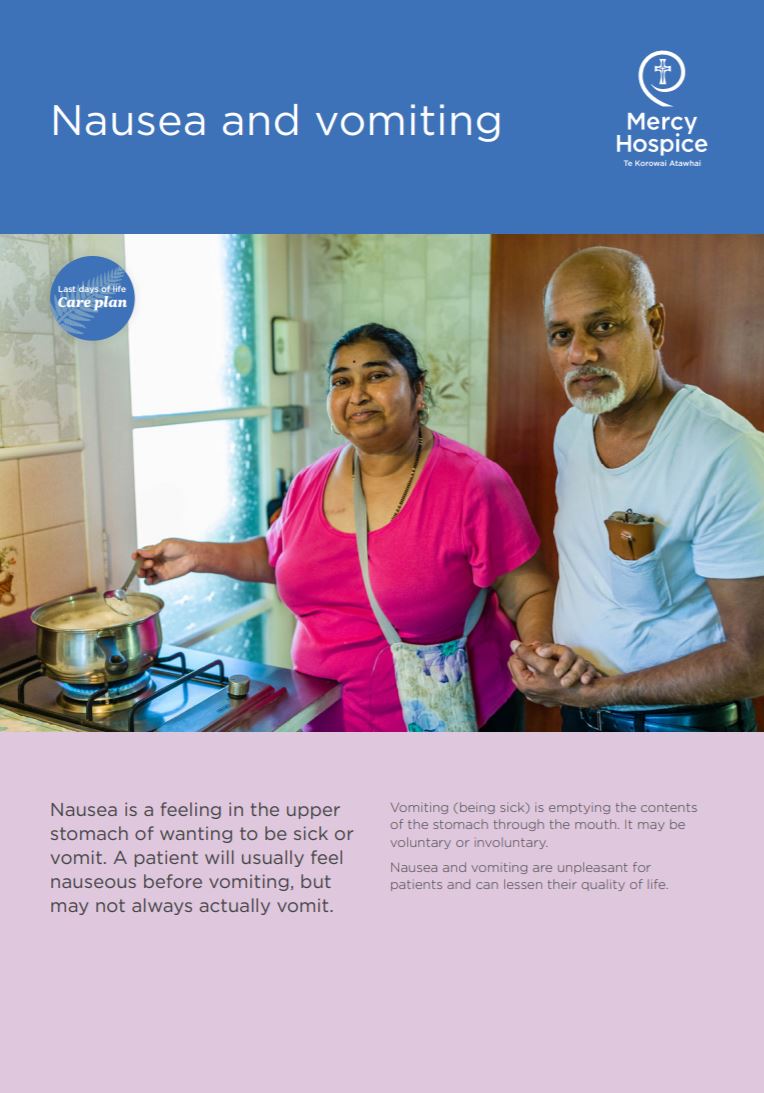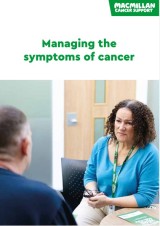You can now add Healthify as a preferred source on Google. Click here to see us when you search Google.
Nausea and vomiting in palliative care
Key points about nausea and vomiting with a terminal illness
- Nausea and vomiting are common in people living with a terminal illness.
- Nausea (feeling sick) is sometimes, but not always, followed by vomiting (being sick).
- Nausea and vomiting near the end of life often have more than one cause, including physical and psychological factors.
- Treatment may include a combination of non-medicine and medicine approaches.
- There are several ways you can help relieve your nausea and vomiting.

Nausea is a queasiness in your stomach that often comes with the urge to vomit (be sick or throw up). Nausea is sometimes, but not always, followed by vomiting.
Vomiting is your body's way of getting rid of stomach contents that are harmful or irritating, by forcibly emptying them back out through your mouth.
Nausea and vomiting near the end of life often have more than 1 cause, including physical and psychological factors. Common causes include:
- medicines such as opioids, antibiotics, anti-cancer drugs, non-steroidal anti-inflammatories (NSAIDs)
- metabolic causes such as high blood calcium (hypercalcaemia), high blood urea (uraemia)
- cancer treatments such as chemotherapy and radiotherapy
- constipation
- infection
- brain disorders such as raised intracranial pressure (high pressure in your brain), brain tumours or metastases
- bowel obstruction (your bowel is blocked)
- an enlarged liver (hepatomegaly)
- your stomach not emptying properly (gastric stasis)
- a stomach ulcer
- vestibular disorders (parts of your inner ear and brain that control balance and eye movement are damaged)
- anxiety and fear.
Your healthcare provider may ask you some questions to find out the possible causes of your nausea and vomiting. They may also do a physical examination to check for signs of illness or disease and carry out tests, such as blood and urine tests, to rule out physical causes.
Treatment of nausea and vomiting may include a combination of non-medicine and medicine treatment. If you have a medical condition or any obvious causes of nausea and vomiting are found, treatment will focus on the condition or cause.
Non-medicine treatment
Non-medicine treatment that can help relieve or prevent nausea and vomiting include:
- acupuncture or acupressure – this treatment can be carried out through wearing a wristband
- counselling – talking to a counsellor or psychologist can help reduce anxiety
- music therapy – listening to music can help you to relax and lower your anxiety
- distraction – looking at some videos or photos with great memories can help distract you from feeling sick.

Image credit: Canva
Medicines
There are a variety of medicines that can be used to ease nausea and vomiting. They work in different ways to one another. The choice of medicine depends on what has caused your nausea and vomiting. These medicines are called anti-sickness medicines or antiemetics. Read more about antiemetics.
Common antiemetics that may be prescribed include:
- domperidone
- metoclopramide
- haloperidol
- cyclizine
- levomepromazine (methotrimeprazine)
- dexamethasone
- prochlorperazine
- hyoscine (Scopoderm TTS)
- lorazepam
- ondansetron
- olanzapine.
These medicines can be taken as a tablet, an injection, a suppository in your bottom, a transdermal patch, an oral wafer or via a syringe driver. Read more about syringe drivers. Sometimes, a combination of these medications is needed to treat nausea and vomiting.
There are several things you can do to help manage nausea and vomiting. These include the following:
Movement
- Sit quietly when you feel nauseous.
- Moving around can make you feel worse.
- Rest after eating and keep your head raised above your feet.
- Avoid activity straight after eating.
Drinks
- Take sips of cool drinks.
- Drink water or diluted fruit juice.
- Sip your drink slowly.
- You may find it helps to drink liquids between instead of during meals.
Eating
- Eat small meals throughout the day instead of 3 large meals.
- Eat light, bland foods (such as water crackers or plain bread).
- Avoid fried, greasy or sweet foods.
- Don't mix hot and cold foods.
- If the smell of hot or warm foods makes you feel nauseous, eat foods that are cold or at room temperature.
- Rinse your mouth after eating to make sure your mouth feels fresh.
Other things to try
- Ginger – some people find ginger helps to relieve feelings of nausea, but this finding is not clinically proven.
- Mint or peppermint – try taking mint or drink peppermint tea.
- Fresh air – avoid smells that make you feel sick.
- Positioning – try sitting in a comfortable position as lying down can sometimes make you feel sick.
- Relax – listening to music or practising relaxation exercises can reduce anxiety and fear.
Apps reviewed by Healthify
You may find it useful to look at some swallowing difficulty apps and pain management apps.
Living with nausea and vomiting can be distressing and affect your quality of life. Talk about your feelings with your family/whānau and friends to get the support you need.
Below are some support services and information for people affected by cancer and their family/whānau:
Emotions and cancer(external link) Cancer Society of NZ
How we can help(external link) Cancer Society of NZ
New Zealand cancer services – find a hospital/service near you(external link) Healthpoint, NZ
More cancer support groups
Nausea and vomiting(external link) Marie Curie, UK
Brochures
Nausea and vomiting [PDF, 245 KB] Mercy Hospice, NZ
Managing the symptoms of cancer(external link) Macmillan Cancer Support, UK
Apps
Swallowing difficulty apps
Pain management apps
References
- Nausea and vomiting in palliative care(external link) Auckland HealthPathways, NZ, 2024
- The palliative care handbook(external link) Hospice NZ, 2019
- Nausea and vomiting(external link) Marie Curie, UK, 2024
- Nausea and vomiting(external link) Scottish Palliative Care Guidelines, UK
- Palliative care – nausea and vomiting(external link) NZ Formulary
See our page palliative care for healthcare providers.
Brochures

Mercy Hospice, NZ, 2020

Macmillan Cancer Support, UK, 2025
Credits: Healthify editorial team. Healthify is brought to you by Health Navigator Charitable Trust.
Reviewed by: Dr Jane Greville, Palliative Care Specialist, Auckland
Last reviewed:





